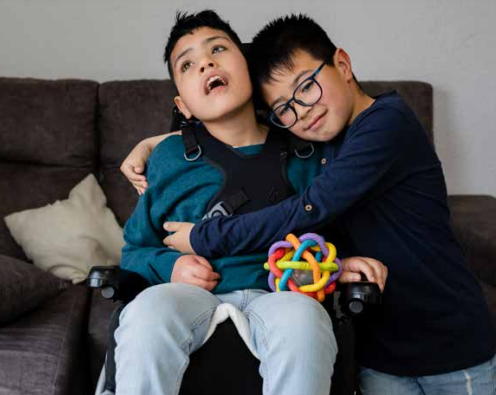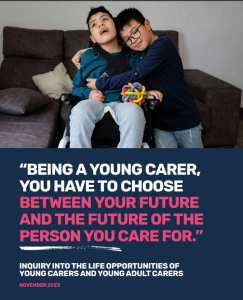All Party Parliamentary Group Report reveals damaging effect of caring on young people's life chances

A landmark inquiry into the lives of young and young adult carers, carried out by the All-Party Parliamentary Group (APPG) for Young Carers and Young Adult Carers, has revealed just how much caring can adversely affect the lives of young people and their future opportunities.
The APPG, working with Carers Trust, heard evidence from young people, professionals working with carers, and organisations across the country, who explained just how difficult things can be, and this evidence is published in the new inquiry report.
Incredible pressures
 The inquiry uncovered alarming evidence showing around 15,000 children, including 3,000 aged just five to nine, spend 50 hours or more a week looking after family members because of illness, disability or addiction.
The inquiry uncovered alarming evidence showing around 15,000 children, including 3,000 aged just five to nine, spend 50 hours or more a week looking after family members because of illness, disability or addiction.
Evidence to the inquiry has highlighted how there are likely to be one million young carers in the UK and the time they spend caring can lead to them falling behind at school and damage their life opportunities.
Yet, despite mounting evidence showing the impact on them of their caring role, the inquiry has shone light on how many young carers are not being identified anywhere near early enough so they can get the support they need. And as the report makes all too clear, this is creating a postcode lottery of support for young carers.
The inquiry heard how some young carers are being left to cope alone for 10 years before being identified, while evidence to the inquiry showed the average waiting time to get support is three years.
The inquiry also heard:
- There are significant waiting lists for assessments and support in some areas with services struggling to meet demand and other areas where particular groups of young carers cannot access any support.
- Being a young carer has a knock-on effect on school attainment and attendance, with young carers missing 27 school days per year on average.
- Young adult carers are substantially (38%) less likely to achieve a university degree than their peers without a caring role.
- Young adult carers are less likely to be employed than their peers without a caring role, particularly if they are providing significant levels of care.
- Young people with caring responsibilities are more likely to self-harm than young people without caring responsibilities. Of children who do self-harm, young carers are twice as likely to attempt to take their own life than non-carers.
Call to action
There are demands for a number of changes, including:
- The urgent introduction of a cross-government national carers strategy, including a properly resourced action plan for young carers and young adult carers.
- The Government should commission an independent ten-year review of the difference the Children and Families Act 2014 and Care Act 2014 have made for unpaid carers, including young carers and young adult carers. Ahead of a new Carers Strategy, the Government should also work with young carers and young adult carers on immediate plans to improve early identification, increase access to support and reduce the numbers of young people providing inappropriate or excessive levels of care.
- The Government should formally support the development and implementation of the first UK-wide Covenant for Young Carers and Young Adult Carers.
Being a young carer, you have to choose between your future and the future of the person you care for
Going to number 10
To coincide with the report release, six young carers/young adult carers handed an open letter in at 10 Downing Street on 14 November demanding Prime Minister Rishi Sunak do more to help.
The letter was signed by more than 1,100 young carers and young adult carers, including young people in Surrey.
Find out more
Read more about the work of the APPG and the report here.
